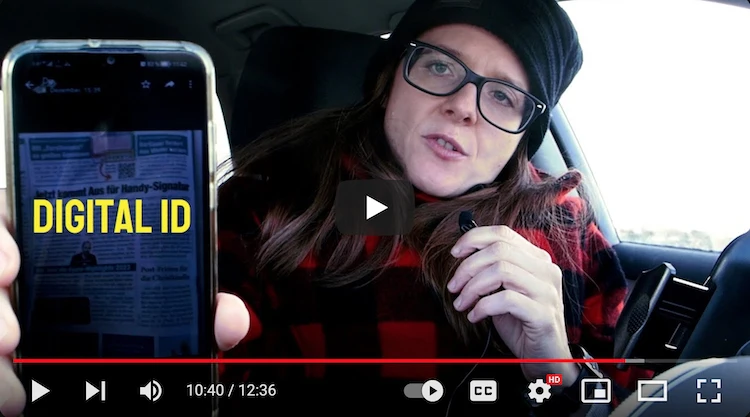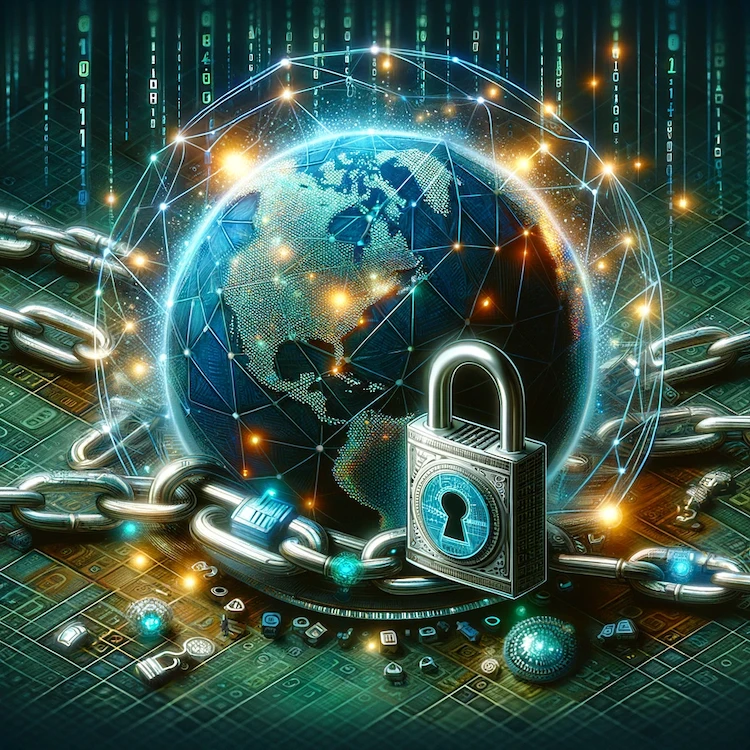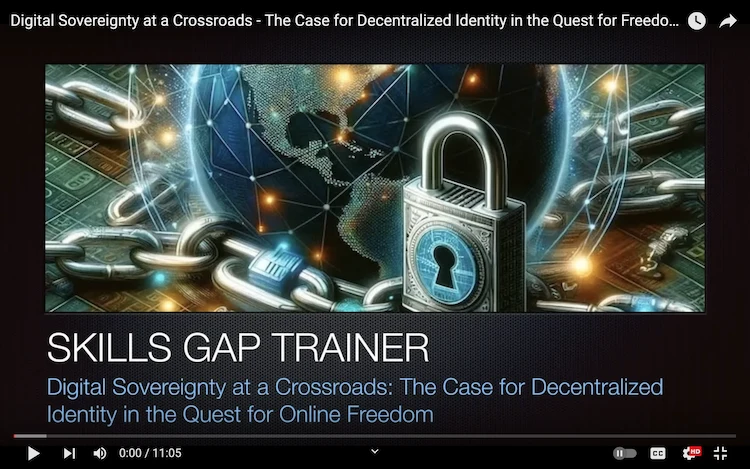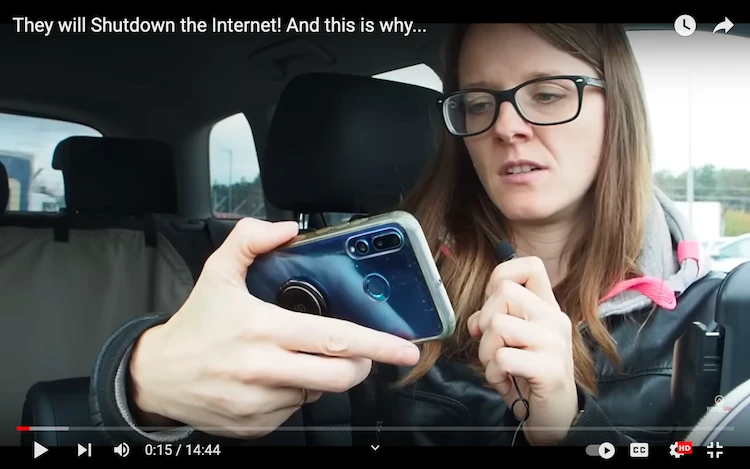Video Title: Digital Sovereignty at a Crossroads – The Case for Decentralized Identity in the Quest for Freedom
@skillsgaptrainer “If memory serves correctly, the info-graphic I saw from the WEF, did not resemble the layout of any of the decentralized tech that is being created in open source right now, it seemed like a desire for centralization, eerily reminiscent of the tightly controlled regime we endured in 1980s Romania—a regime that draped itself in the velvet words of socialism while wielding the iron fist of communism. Who could have imagined that not a single book, a single speaking human, not one whisper or television broadcast could be found anywhere in sight or escape the omnipresent gaze of the party?
Yet, here we are, witnessing a global march toward a similar precipice. The vast walls, tightly guarded borders, 30 foot iron gates with spikes, men in green with arms standing like statues in the snow, polishing arms every single day and every single night, and sentry watchtowers always on the look out, that once stood as symbols of division have morphed into invisible digital barriers, and informal backdoor communication systems and grapevine and digital lists, just as potent in their ability to isolate and control. The question posed by this impending digital ID system is profound and deeply personal: Who will be left out in the unforgiving cold, or the dry sand, and who will be granted passage through the steel gates into the warmth of the community? .
The answer, it seems, lies in the very fabric of decentralization. For without it, we surrender our fate not to our family, not to our neighbours, not to our communities, but to faceless entities thousands of miles away that do not understand voting systems and user authority — strangers who, without a touch of irony, hold the power to decide who thrives and who merely survives. This is a power that, if history has taught us anything, must reside closer to home, safeguarded within the community, and not left in the hands of those who have never felt the biting frost of a harsh winter borne of misplaced trust. Want to live in the 21st century without firearms? Your strongest in the house will have to pick it up again if you get this wrong, if you let them rush you, to have everyone else design these systems except the engineers. Remember, engineers are designers, and politicians are not software architects.
“Survival Lilly” latest video has ignited an urgent conversation about the prospect of an internet shutdown and the motives that might lie behind such a drastic move. While your expertise lies in history and geopolitics, the implications of your discussion extend into the realm of digital survival and the fundamental freedoms associated with our online lives.
The potential shutdown Survival Lilly speaks of isn’t just about turning off the switch to prevent a cyber-catastrophe; it could signify a deeper struggle for control over the global internet infrastructure. The discussions she presented remind us that our digital ecosystem is as vulnerable to power grabs as any physical territory.
Diving deeper, the technical aspect, as understood by those of us engrossed in the engineering and cyber-security fields, suggests that the current internet architecture – our Web 2.0 – is indeed fragile. It lacks the decentralized robustness that block-chain, user owned hardware ID password keys, hardware digital ID keys, cryptography and other Web 3.0 technologies promise. Your video, then, touches a nerve for us: the need for a democratized, public domain, open-source internet, and set of public domain or public utility block-chains, where power and control are not centralized but distributed, much like the block-chain model itself.
Eva, your comments at ARC resonate with our concerns, albeit from a geopolitical and technical standpoint as well. You speaks to the typical human desire for power expansion and control on a global scale, an issue that intersects with our technical fears of a centralized digital ID system that could lead to unprecedented surveillance, and loss of privacy.
In today’s digital age, the idea of a centralized digital ID system might seem like a step towards efficiency and security, but it’s crucial to understand the implications of what we might be giving up in exchange for convenience. Let’s delve into some risks associated with such a centralized system.
Firstly, our privacy is at stake. A centralized ID system could track and profile every digital footprint we leave – what we buy, where we go, what services we use. It’s like having a silent observer in every aspect of our digital lives, one that could share our personal habits and preferences without our explicit consent.
Then there’s security – or the lack thereof. Imagine all our personal data, the key to our digital lives, stored in one place. This becomes a jackpot for cyber-criminals. A breach in a centralized system doesn’t just leak information; it gushes out identities, potentially leading to widespread fraud and identity theft, potentially on a national or global scale.
Our very autonomy is on the line, too. With centralization, we could lose control over our personal information. It’s akin to entrusting the keys to our digital homes to someone else – someone who decides who gets in and who doesn’t.
This brings us to inclusion. A one-size-fits-all approach rarely fits all. A centralized ID might not accommodate the unique circumstances of various groups, potentially marginalizing those who don’t or can’t conform to the standard mold.
Our freedoms, the cornerstone of our society, could be curtailed. A centralized system, if misused, opens the door to surveillance and control on an unprecedented scale, turning the tools of access into chains of restraint.
Anonymity, a shield for the vulnerable – whistle-blowers, activists, political challengers, reporters, and dissidents – would erode. Our ability to change the government if it acted against the public interest, would dissappear. The ability to speak out against power without fear of retribution could vanish, silencing crucial voices of dissent, that might be the voices needed to vote out an ineffective or malicious actor who has gained power.
The issue of choice and consent also arises. Could we really say ‘no’ to a centralized system when it becomes the gatekeeper to essential services? Healthcare? Medicine? Water? The balance of power could shift dramatically, leaving individuals with little say in matters that concern their personal identity.
And finally, let’s consider the power dynamics at play. A centralized digital ID system inherently concentrates power among the select few who control it, risking the creation of a dynamic where the majority are subject to the will of a powerful minority – a modern digital feudalism of sorts, where citizens could become more like subjects to digital overlords. This is already happening economically in Canada. The last bastion of citizen authority resides on the internet, and it is about to be extinguished.
The spectre of historical oppression looms large; humanity’s long and painful history with various forms of subjugation is a stark reminder of the perils of concentrated power. To prevent a recurrence in the digital realm, we must advocate for multi-level (state and federal) involvement as well as a private sector involvement, but not in terms of the management of the ID but in terms of it’s authentication and verification, and backup nodes offered, as well as basing it on decentralized identification models (respecting established national borders, or even better, holding data backup nodes in decentralized ID on different nodes by city). Such systems ensure that no single entity or ID backup node operator can wield undue influence over individuals’ identities, particularly across city boundaries, state boundaries or province boundaries, and especially across geopolitical nation state level boundaries.
The administration of digital IDs should be localized, residing primarily with the individual user, on a hardware key similar to a Ledger Nano X. The role of ID managers – which, in the case of Canada, would be the Federal and Provincial governments – should be limited to providing a dual-layered, multi-signature backup service for ID recovery, which would interface with user-controlled hardware keys. In this way, the critical power of deletion is ultimately held in the hand of the user and their secret backup locations. This structure not only empowers citizens but also enshrines a robust protocol for ID restoration that respects national sovereignty and personal privacy.
Further, the option to provide private backup nodes to users, should also be available, so as to prevent a potentially malicious government from potentially refusing to provide a backup restoration of a digital ID to a user who has lost their hardware digital ID keys.
In the event that an external IT provider attempts to access an individual’s ID from another nation, it should trigger a response from that nation’s security apparatus, preferrably the DND with an F-18. Such a protocol would be in accordance with the principles of governance that uphold a country’s operational hierarchy and the security of its citizens.
By adhering to these principles, we safeguard not just the integrity of our digital identities but also the very essence of our freedom and independence in the digital age.
As we chart the course of our digital future, these are the concerns we must address head-on. Ensuring that the path we take doesn’t lead to a place where, in our quest for digital order, we don’t trade away the very liberties and rights that define us.
You and Lilly, from your respective vantage points, underscore a truth many of us in the tech community recognize: the internet’s potential as a democratic space is at risk of being co-opted by a select few. This is not just a theoretical concern but a practical one, as the engineering solutions to these problems – like public domain block-chains and secure, decentralized platforms – are still in their infancy.
The call to action in Lilly’s video – to prepare and resist – give the open source engineers time to mature the block-chain ecosystems and don’t let them rush you into the digital ID – it’s thus not just a physical call to arms but also a digital one. It is a reminder that the true value of the internet lies in its ability to empower individuals and communities, not in its capacity to control or restrict them.”
Related Content:
Video: Digital ID
YouTube Link: https://www.youtube.com/watch?v=zqubDMHd-rU
@skillsgaptrainer “Great video! The quality of your content is exceptional, and your presentation is crystal clear. The topics covered are not only relevant but provide insightful perspectives on complex issues. We found your video particularly enlightening in the context of Digital ID and have featured it as an enhancement to our technical ID design article titled ‘Digital Sovereignty at a Crossroads: The Case for Decentralized Identity in the Quest for Online Freedom’.
While it’s commonly understood that Digital IDs can shift power from the citizen up the power hierarchy to the federal government and even to global corporate alliances, compromising the privacy of citizens, what might not be immediately obvious is how such systems could herald a new global tech order. This order could potentially transfer governance authority from the government and the administrative state to the global corporate tech sector of the 21st century, possibly challenging the federal government of Canada for leadership. This raises a concern: while people worry about being dis-empowered within a digital ID ecosystem, Members Of Parliament and other government administrators should also recognize that a “Digital ID system with centralized governance and management control model” could be a competing system to the federal and provincial governments of Canada, possibly a double-edged sword for traditional governance functions in Canada as well, not just the self-governance of citizens, if not immediately then eventually. Therefore, it is crucial not to hastily adopt Digital ID systems on somebody elses rushed timeline, particularly those with a centralized governance design philosophy reminiscent of the 20th century. If a timeline is rushed beyond the capability of the open source community to keep up, then one has to wonder what is behind such motivations to possibly compromise the governance model of Canada. Such decisions should not be rushed and ought to be made in consultation with the Canadian public and federal government officials who prioritize a nation-state allegiance mentality. It might be wiser to take the time to ‘develop decentralized control architecture’ for Digital ID designs. These designs should be created by engineers and software architects who are free from politically or corporately inspired influences, focusing on cybersecurity, decentralized multi-signature control panels, blockchain-based hardware Digital ID keys under user control and user possession, and principled cyber-security and privacy-focused engineering principles rather than corporate or political agendas. This approach should distribute control functions across various social hierarchy levels, including users, private enterprises, provincial governance organizations, city officials, and the federal government. This balanced distribution of power could maintain the integrity of the system and safeguard against potential overreach. Perhaps it is advisable for politicians to allow the open-source developer community, communities such as Bitcoin, Solana, Cardano, Ethereum, Algorand, Hashgraph etc.. to grow sufficient in size so as to begin to address such problems. By providing computer science communities adequate time to research, learn, and develop more robust models of decentralized identity systems, public safety, national governance security and national security can be safeguarded. This patient approach, rather than hastily adopting the first proposed system, would provide society, engineers, scientists, and developers the necessary time to thoroughly understand and integrate concepts of user privacy, control, and authority models in relation to digital ID and its security management”
Video: Why Bill Gates is Pushing for Global Digital IDs and Taking Over America’s Farmland – Samus Bruner
YouTube Link: https://youtu.be/OHKlt-ik95Q?si=6_rBJZC2q8HGm4Cu
@skillsgaptrainer “Michelle, your comprehensive coverage across various domains including commodities, finance, alternative investments, currencies, geopolitics, innovation, crypto-currencies, technology etc.. is very impressive display of multi-disciplinary expertise, and similar in nature to the wide range of professional skills that a few of our Skills Gap Trainers display. Your ability to delve into so many critical areas, and well chosen areas, with such depth and clarity significantly reduces the need for traditional banking investment advisors, technical trainers, colleges and even conventional news agencies. The depth of your work is so impactful that we’ve included a link to your Digital ID video in our article, ‘Digital Sovereignty at a Crossroads: The Case for Decentralized Identity in the Quest for Online Freedom’, that we just published on our platform. This addition underscores the relevance and value of your insights in broader discussions on digital sovereignty and online freedom. We consider to look through the Kitco database of videos for technology related videos to see which ones we can link to from our site or which ones can help us to generate some insight on these topic areas. Thanks! The information you provide is not just informative but also incredibly resourceful, making it unnecessary to seek out other YouTube channels or revert to legacy media for valuable insights. Your dedication to covering all these critical jobs is admirable, and you excel in each one of them. Keep up the excellent work! It seems there are Skills Gap Trainers everywhere in society, not just at our organization.”
Video: Konstantin Kisin – The Speech The World NEEDS To Hear

YouTube Link: https://youtu.be/gR7nVYz9rJo?si=aEziuwdl1MoAvZo2
@skillsgaptrainer “Konstantin, you have perceptual and creative thinking abilities that seem to make you really excellent and on point at expressing the most up to date and most important takeaway or core message of our time. Out of all of the numerous portfolio of challenges humanity faces today, you are excellent at discovering the most efficient way to actually outline the problem and solution. Our Director Valentin of Skills Gap Trainer, also mentioned a similar core message to Rod of CCFR YouTube Channel based out of Canada, pertaining to the fight in Canada over the new trend of discrediting property rights in Canada via direct Orders from government without the typical legislative process in law creation. Courts in Canada are starting to rule along the lines of “The Governor in Council does not owe a duty of procedural fairness to firearms owners affected by the Regulations”.
Thanks for calling it as it is, that business, political and community leaders are in the “fight of our lives”. This is evident even at SGT, where just the other day one of our board members Valentin, wrote comments to the CCFR:
“Good Job Rod. In war, the true soldiers they don’t fight until they sense the battle is lost. They don’t place themselves above the needs of the other soldiers and the needs of the people they defend. They simply fight until they win or until they perish. Thank you for understanding this mature aspect of being a human being.“
This message, just yesterday, seems to really resonate to the “we are in the fight of our lives” message. It is as if you continually find exactly what the main challenge and main problem and main solution is for the entire western world. You continually read the minds of individuals as they are presented with national and global challenges. It is clear to us that because you vocalize this key insight into the western world dilemma, that some of the business owners are also discovering, you help solidify the feeling that we are right to take action that adheres to the law but that unfortunately is actually inherently dangerous to make a difference that is positive now, dangerous even to a person’s business or board or team members, as long as it is for the good of all. It seems your business acumen, or business leadership style, is also the style of a philosopher, or war hero, or a commander of an army. So you just brought some valour and courage into the business world, or among elite circles. You should charge for this badly needed service greatly.“
Video: The fight against globalism (ft. Eva Vlaardingerbroek)
YouTube Link: https://youtu.be/W90ngrrsXXE?si=STFbk4C_Txb8QLJ5
P.S. “Way to go Eva! This is your Knight! The horse is ready, and the sword is polished. Not quite a prince yet, but after we battle the WEF.. maybe! Eva, your rallying cry has not gone unheard, as it reverberates with the clarity and fervour of a knight ready for battle.”
P.S. “Eva: Don’t hang out with Konstantin.. he just uses fancy words to impress people. At Skills Gap Trainer, we don’t do that. 🙂 We use digital course products, its more sophisticated than “traditional public speaking” which Konstantin does. :)”
Video: They will Shutdown the Internet! And this is why…
YouTube Link: https://youtu.be/8lNu0iqU6tU?si=27DTjl0QWP0B9z5X
@skillsgaptrainer “Digital Sovereignty at a Crossroads: The Case for Decentralized Identity in the Quest for Online Freedom . Way to go Lilly! Surprisingly, you deliver the most devastating news, but since you are speaking, it’s not stressful at all. For some reason, when we deliver devastating news, people get stressed out. Your latest video has ignited an urgent conversation about the prospect of an internet shutdown and the motives that might lie behind such a drastic move. While your expertise lies in survival and preparedness, the implications of your discussion extend into the realm of digital survival and the fundamental freedoms associated with our online lives. The potential shutdown you speak of isn’t just about turning off the switch to prevent a cyber-catastrophe; it could signify a deeper struggle for control over the global internet infrastructure. The discussions you’ve presented remind us that our digital ecosystem is as vulnerable to power grabs as any physical territory.”
Video: DIGITAL ID

YouTube Link: https://youtu.be/FwfrcJxBtMs?si=exGhx4kBUTxKVyed
@Concern70732755“I urge you all to watch this video presentation -Trudeau is attempting to threaten / leverage Premiers to adopt Digital ID or he will withhold funding!”

@SkillsGapTrain SIGH. It’s concerning how QUICKLY and SECRETLY the Digital ID proposals are advancing with minimal opportunity for THOROUGH REVIEW. The process almost seems deliberately FAST-PACED, potentially to bypass scrutiny from STEM professionals and security committees in Canada, America, and Europe.
It’s alarming how RAPIDLY and CLANDESTINELY the Digital ID proposals are being pushed forward without adequate public scrutiny or transparent discussions by experts via online X and YouTube intellectual review and review by University Professors (PEng, PTech, I.S.P., AScT) and review by security institutions in Canada (DND/CAF, CSIS, RCMP, SECD, UVic/UBC, Justice Institute BC, etc..).
‘Humanity’s experts are no longer necessary it seems. Humanity’s security systems of nation state architecture are also not necessary it seems.
They are all gone and missing in action (or actually, better to say “inaction”).’
‘Only the thousands of CEO’s aligned behind WEF seems to be the only people that make decisions nowadays. So why do we say democracy?’
Politicians can roll out systems for people at will now, in secret too, without presenting their plan slowly for public review, academic/technical review, business community review, and nation state security review in transparent and televised way. The CBC talks about eating Kale for indigenous health while the world faces risk of subjugation in digital chains. They are complicit in this.’
How do we know these systems are completely sovereign and in respect of provincial authorities in provinces of Canada?
How do we know Premier Danielle Smith has authority over this system and can over ride it if it is misused against someone in the province? Where is this information?
And why does the Liberal Party make it such that any business in Canada that wants to have a copper mine, has to wait 20 years for a permit, but when it comes to the survival of human beings and freedom of humanity (which would be in danger from such a system if improperly implemented)..
sure.. …
that should be done in secret and in 1 year with no intelligent aspect of society and any aspect of society that has a value system and a security mindset cannot be involved either and anyone loyal to Canada like the security officers cannot be involved either and public safety institutions cannot be involved either. (Not suspect at all guys.. eh.)
There’s a critical need for televised, scientifically moderated debates to ensure these decisions are made openly and with informed consent of the various parties responsible for citizen authority (social contract), citizen security, citizen prosperity and citizen safety.
Only then will the public be able to tell if these systems align with the legal structure of Canada (which is quite sophisticated and quite a lot of pieces of legislation).
Given the harsh implications, it’s essential that tech employees across Canada have the opportunity to fully understand and review these proposals before they’re implemented and to ensure they match the dozen+ pieces of legislation promised as rights and freedoms to Canadian citizens as part of the nation state architecture (social contract and legal contracts).
Related Content:
Title: “Guarding the Citizens: The Essential Role of Citizenship Ceremonies in Canadian Identity and Authority” x.com/SkillsGapTrain
Title: “The Digital Balkanization of Canada: How Trudeau’s Technophobic Neglect is Fracturing the Nation & Forcing a Choice Between Stagnation & a Corporate World Order”x.com/SkillsGapTrain
Title: “Unmasking the Assault: How Ideological Subversion and a Disregard for Heritage Are Undermining Canada’s Military”x.com/SkillsGapTrain
Title: “Canada’s Future at Risk: The New Global Threats to Our Borders and Security”x.com/SkillsGapTrain

Recommended readings and references:
“The Age of Surveillance Capitalism“ by Shoshana Zuboff: This book provides a profound exploration of the challenges to personal autonomy and privacy posed by big tech companies and the data economy, relevant to discussions on digital sovereignty and identity.
“Blockchain Revolution“ by Don Tapscott and Alex Tapscott: An essential read for understanding how blockchain technology can enable decentralized systems and secure digital identities, pertinent to the article’s focus on decentralization .
“The Sovereign Individual“ by James Dale Davidson and Lord William Rees-Mogg: This book discusses the rise of digital sovereignty and the transformation from industrial to information societies, which aligns with the article’s themes.
“Digital Cash: The Unknown History of the Anarchists, Utopians, and Technologists Who Created Cryptocurrency“ by Finn Brunton: Provides a historical context for the development of digital currencies and decentralized technologies, which can deepen understanding of the article’s subjects .
“Who Owns the Future?“ by Jaron Lanier: This book addresses the concentration of power in the hands of tech companies and proposes a new model for a more equitable digital economy, relevant to discussions on centralized vs. decentralized control.
“Future Crimes: Everything Is Connected, Everyone Is Vulnerable and What We Can Do About It“ by Marc Goodman: A detailed look at cybersecurity and digital privacy that would complement discussions on the security of digital identities .
“Life After Google: The Fall of Big Data and the Rise of the Blockchain Economy“ by George Gilder: Discusses the potential decline of centralized internet services and the rise of blockchain and decentralized technologies.
“Radical Technologies: The Design of Everyday Life“ by Adam Greenfield: This book offers critical perspectives on the digital technologies shaping our lives, which can add depth to the discussion on digital identity and sovereignty.
“In the Plex: How Google Thinks, Works, and Shapes Our Lives“ by Steven Levy: Provides insights into the operations of one of the biggest tech companies influencing digital identity and privacy.
“Privacy’s Blueprint: The Battle to Control the Design of New Technologies“ by Woodrow Hartzog: This book explores the relationship between technology design and privacy, offering a legal perspective on digital identity issues, which complements the technological and sociopolitical angles discussed in our article.
To see our Donate Page, click https://skillsgaptrainer.com/donate
To see our YouTube Channel, click https://www.youtube.com/@skillsgaptrainer




